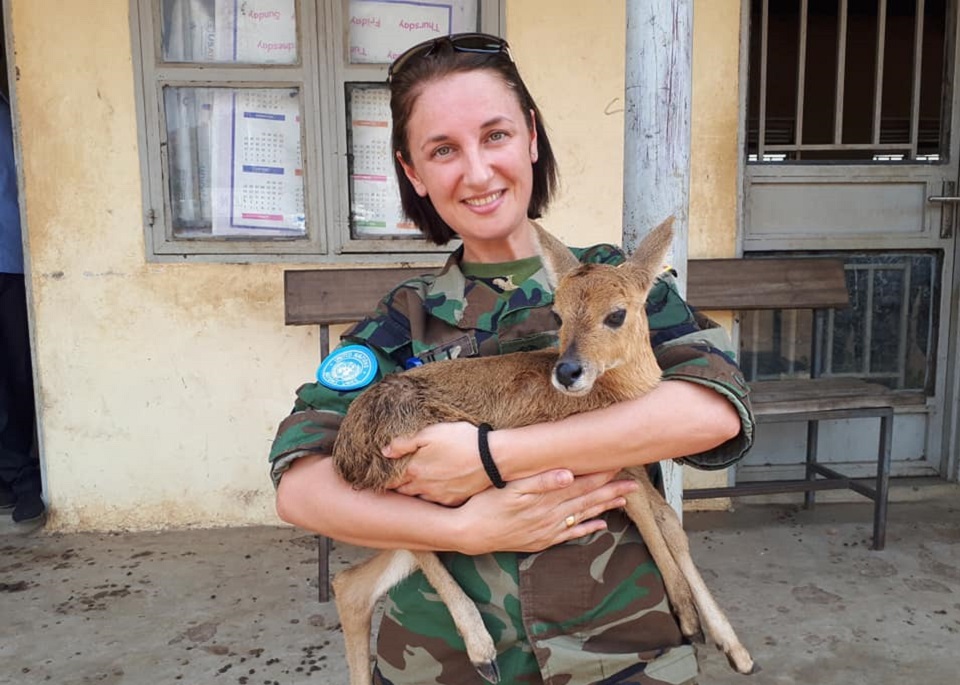Looking Beyond 2020: Advancing Women, Peace and Security in Eastern Partnership Countries
Date:

(Istanbul, online, 16 December) – Forty-one women’s organizations, peacebuilders and activists from Armenia, Azerbaijan, Belarus, Georgia, Moldova and Ukraine recently came together for a series of virtual consultations aimed at sharing views and highlighting solutions towards the Women, Peace and Security (WPS) agenda in Eastern partnership countries. The ‘Looking Beyond 2020: Advancing Women, Peace and Security’ consultations were organized by the UN Women Regional Office for Europe and Central Asia and the UN Women Georgia Country Office.
Participants brought their own unique perspective from working with diverse groups of women and girls in their communities. The consultations aimed to identify solutions, such as models for a regional network of women peacebuilders. Such a network could enable exchanges of best practices, promote and support the full, equal and meaningful participation of women in peace processes, and help forge links between the formal and informal peace processes. This is a follow-up to the UN Women consultative meeting with civil society organizations on WPS held in February 2020 in Istanbul, Turkey.
The consultations also provided a safe space for women and youth civil society representatives to discuss solutions to prevent, mediate and resolve conflicts from a feminist perspective. This is more important than ever, given the current raise of social unrest and conflicts in the region. Through the participation and leadership of women as key actors sustainable peace locally and regionally can be achieved.
During the discussions, solid recommendations were made and compelling points regarding the current challenges, especially in the areas of conflicts, were highlighted. Various participants reiterated the importance of need to enhance collaboration as well as unity among different stakeholders around common goals related to peace and security in the region.
Olena Suslova, Founding Director and Board Chair of the Women’s Information Consultative Center, and Gender Mainstreaming of the Ukrainian Parliamentary Development Project, underscored the importance of inclusion, accountability, and networking. She further noted that “Accountability is a crucial concept and should be taken very seriously. There are concerns with regards to the lack of accurate information about the results of the projects, especially in times of war. We call for urgent action and believe that accountability should be sought for all stakeholders”.
Participating panelists asserted that there is a need to work towards making peace more valuable and appealing and promoting its benefits and privileges. Another crucial point of discussion drew attention to the specific discrimination and human rights violations faced by women defenders and the need to ensure their protection.
“Women’s needs are not made priority, trying to help women is not easy, in some places, we see vulnerable women such as pregnant women live in terrible conditions, we need more investment in women’s empowerment and gender equality principles, especially in conflict-affected settings,” underscored Sevinj Samadzade, Gender Resource Center from Azerbaijan.
Civil society organizations highlighted the importance of contributing to diversity and inclusiveness, which are the strengths of the networks to hear unheard voices, including those without platforms or agency. Their expertise and experiences need to be valued.
“Contributing to diversity and inclusiveness which are the strengths of the networks to hear unheard voices, include those without platforms or agency, and value their expertise and experiences is crucial,” said Alexandr Gonchear, Resonance Center from Moldova.
During the group discussions, participants from different backgrounds and geographies underscored the importance of encouraging young women to establish their organizations and initiatives, and to support intergenerational cooperation towards common goals such as building a transnational feminist movement grounded in anti-militarism.
“It is important to remember that the inclusion of the elderly and the youth, trans-generation involvement is of paramount importance,” highlighted Julia Kharashvili, Chairperson, IDP Women’s Association “Consent” from Georgia.
Meanwhile, the panelists underscored that youth are leaders of today, not tomorrow. For this reason, young women’s participation in peace and security spaces are at the core of any network building. Likewise, engaging youth coming from diverse geographies to support intergenerational dialogue and inclusion of different perspectives and experiences was also key.
Both during the plenary sessions and group discussions, the importance of investing in women’s empowerment and gender equality principles in conflict-affected settings was emphasized. Participants also elaborated on the need to build a pool of women experts on WPS across the region, ensuring the inclusion of women and their voices from disputed areas, so that they had an equal and meaningful opportunity to participate. The discussions further noted that women’s networks are guided by feminist principles of peace and should apply diversity and inclusion elements throughout their processes.
When it came to discussing innovative solutions to prevent, mediate and resolve conflicts from a feminist perspective, the need for diversity in the networks alongside youth involvement in the context of peace were highlighted. Solid recommendations were also made about going beyond traditional networks and including novel ones in order to reach more women.
The plenary discussions drew attention to the disproportionate impact of conflicts on women, exploring different aspects, for example, economic consequences and physical threats against women. Women`s organizations stressed that they remain excluded from formal peace processes and emphasized the importance of resisting systematic marginalization of women in post-conflict recovery and reconstruction. Further collaboration among civil society organizations and other actors was strongly encouraged to find innovative solutions to protracted conflicts by cooperating internationally, enabling intergenerational dialogue, and supporting mentorship among women in its diversity. At the same time, it was important to ensure that there is recognition among and within civil society organizations of their work.
Lastly, joint regional advocacy efforts to support the recognition of women’s expertise in peacebuilding and their promotion as valuable assets to achieve sustainable peace was underlined. This can only be realized if there is adequate support and funding to peace and confidence building initiatives in the region.